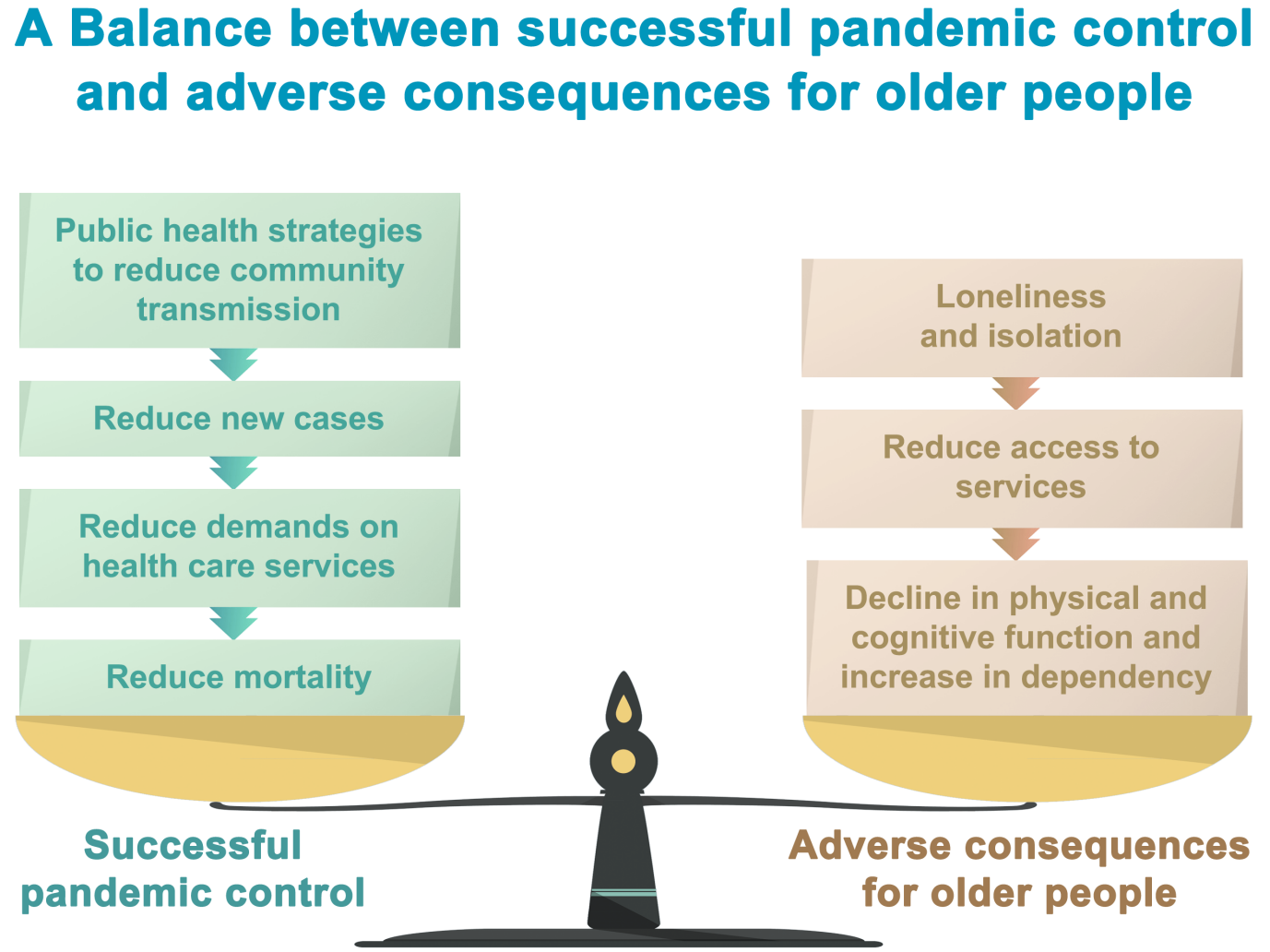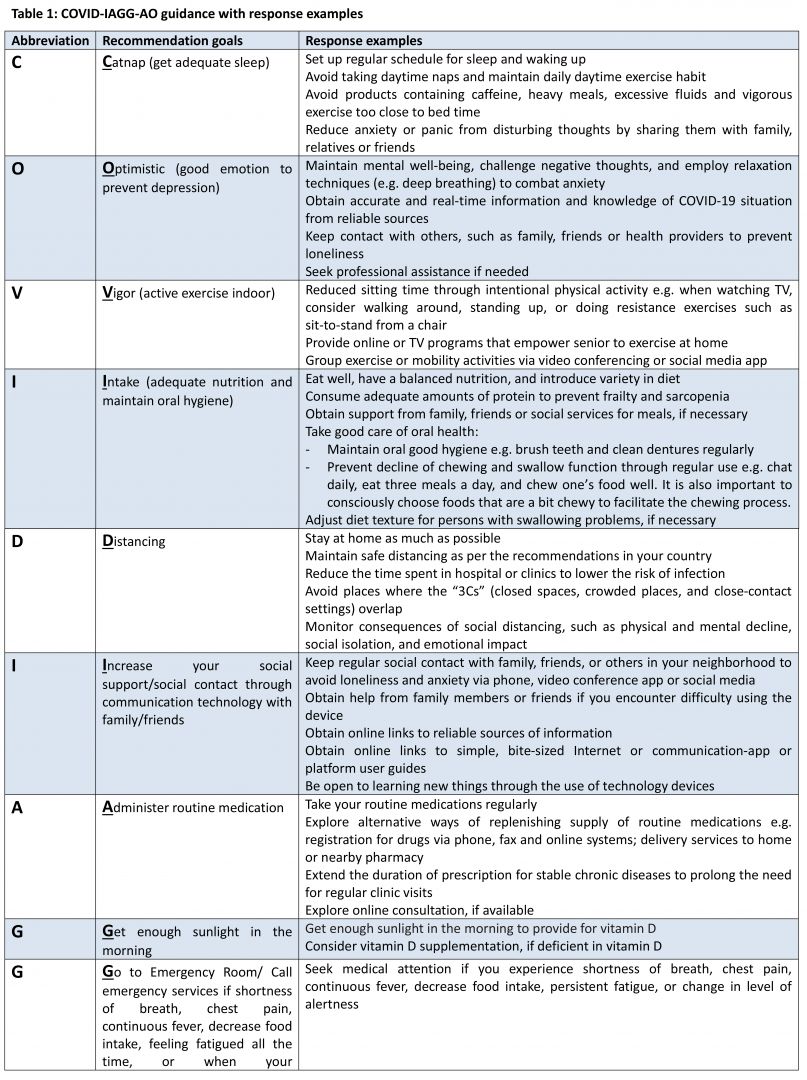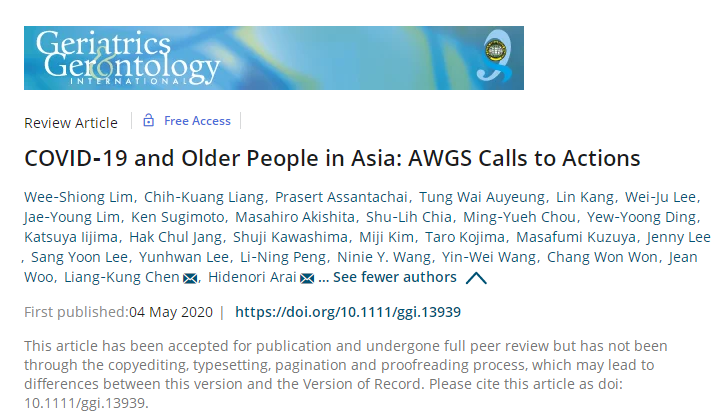In order to deal with the impact of the coronavirus disease 2019 (COVID-19) pandemic to the elderly, the Asian Working Group for Sarcopenia (AWGS) summarized the considerations of Asian countries focusing on responses and difficulties in each country, impacts of health inequity related to COVID-19 pandemic and proposed recommendations for older people which are germane to the Asian context. More innovative services should be developed to address the increasing demands for new approaches to deliver health care in the difficult times and to establish resilient health care systems for older people.
Experts from 23 medical institutions in Asian countries and regions jointly formed the proposal, among which Lin Kang, Professor of Geriatrics Department, provided the experience from Peking Union Medical College Hospital. The related article "COVID-19 and Older People in Asia: AWGS Calls to Actions" was published online in the International Journal of Geriatrics and Geriatrics (Geriatrics & Gerontology International) on 4th May, 2020 .

The paper firstly introduced the experience of mainland China represented by Peking Union Medical College Hospital (PUMCH). In order to reduce the risk of aggregation and respond to the routine medical needs of patients, especially frail older patients, many general hospitals in mainland China such as PUMCH have opened and continuously expanded its online specialist consultation service. Patients can get specialist guidance and help online through official App. This innovation by PUMCH to use "Internet + Medical treatment" serves to relieve the pressure of routine medical demand and benefit the majority of patients.
During the COVID-19 epidemic, all online consultation services were free of charge, focusing on alleviating the difficulty of patients seeking medical treatment during the epidemic. In response to the COVID-19 epidemic, PUMCH undertook scientific treatment and specific measures, including constantly expanding the service radius and releasing high-quality medical resources such as the scientific epidemic prevention e-book "Questions and Answers for Public Protection against COVID-19 infection" and "Psychological Protection Association and practical Handbook for all kinds of persons", which can be read free online.
Outside of the hospital, home care services were suspended or became untenable across the country. As a partner for pre- and post-hospitalization care continuum of hospitals such as PUMCH, Pinetree Care Group decided to continue providing support to patients at home. It moved most services online and launched full virtual rehabilitation and nursing classes to empower patients and their families to do self-care; organized regular webinar sessions by national experts from different disciplines; and activated online communities /groups to quickly identify and respond to needs for telecare, teleconsultation and delivery of medications/medical supplies.
Experts from other countries and regions in Asia have also put forward their own experiences. In Hong Kong,China, Geriatric Day Hospital services (where comprehensive geriatric assessment, diagnoses and medication optimization, and rehabilitation take place for community living older people) have been suspended. One commendable measure is government funding for private practitioners and also HA-employed visiting doctors to manage episodic illness at the Residential care homes for the elderly (RCHE) during this epidemic. In Japan, the government encouraged people to avoid places where the "3Cs" (closed spaces, crowded places, and close-contact settings) overlap and to observe social distancing based on the recommendations of the Advisory Committee. Singapore supportive measures to minimize disruption of healthcare services to older adults included medication delivery services; tele-consultations to minimize hospital visits; use of technology to help older adults stay connected; and financial assistance schemes. These were supplemented by ground efforts from NGO, voluntary welfare organizations and ad-hoc volunteers to support affected older persons and their caregivers. In Korea, restrictions are being imposed on health care for seniors, especially, frail older adults. Ministry of Health and Welfare issued a temporary regulation that allows telephone-based consultation and prescription. And the Geriatric Society released the guidance and advice for living tips against COVID-19 for older adults. In Taiwan, China, the Health Promotion Administration of the Ministry of Health and Welfare published recommendations for older adults to prevent functional declines, loneliness, and isolation during the pandemic and suggested regulated social activities, indoor and outdoor exercise programs. Thailand also responded to COVID-19, under the primary health care supported by the health volunteer system, more than 1 million health volunteers are working in the community nationwide to survey, detect, quarantine or refer the suspected case to the hospital nearby.
From the rich accounts of the country experience, we propose the following recommendations for older people in the Asian context which complement the recently published guidance from the International Association for Gerontology and Geriatrics, Asian/Oceania (IAGG-AO) region on prevention of COVID-19 in older adults. The mnemonic COVID-IAGG-AO (Table 1) was proposed as a basic guidance to prevent COVID-19 in older adults.
In addition, it is important to reconsider the preventive and management strategy for populations which require special considerations. AWGS advocates that we should pay attention to persons with dementia and their caregivers, home-bound seniors, frail older adults admitted to acute hospitals, and research regarding geriatrics-specific issues, and recommends that ethical frameworks that are developed for outbreak response should not automatically disqualify older people from access to intensive care on the basis of age cutoffs.

Article Link:https://onlinelibrary.wiley.com/doi/abs/10.1111/ggi.13939
Writer: Liu Shuo, Kang Lin
Editor: Tan-ping Fu

